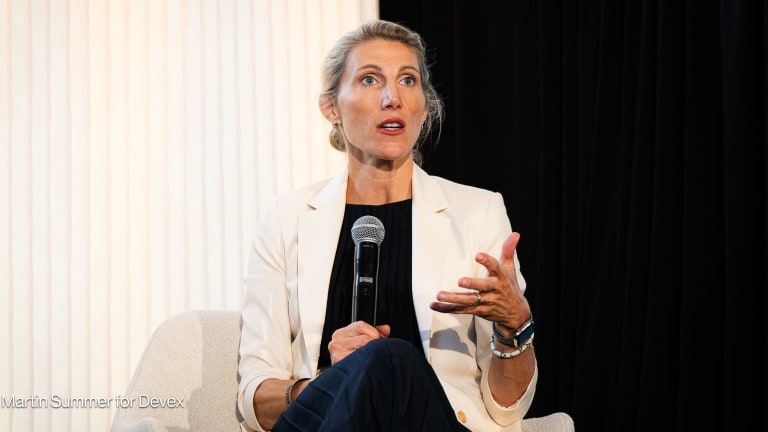Responses to climate disasters must be LGBTQ-inclusive, experts say

ALICANTE, Spain — Humanitarian organizations must do better in making their disaster prevention and response activities accessible to the LGBTQ community, according to panelists at the International Federation of Red Cross and Red Crescent Societies’ Climate:Red Summit this week.
Meghan Bailey, senior technical adviser at the Red Cross Red Crescent Climate Centre, said that as climate disasters become more frequent, services offered by organizations must be made accessible to avoid intentional or unintentional discrimination against those who identify as LGBTQ.
“The whole world is experiencing climate stress, and we as a movement have a responsibility to ensure the support we provide is not unintentionally discriminating against particular minority groups,” she said.
Almost 200 weather-related disasters were recorded in the first half of 2020, including Cyclone Amphan in India and Bangladesh, floods in Indonesia, and droughts in Africa.
Q&A: LGBTQ discrimination expert sees 'paradigm shift' at UN
Countries are starting to see the importance of having a conversation around violence and discrimination, says Victor Madrigal-Borloz, U.N. independent expert on protections for LGBTQ people.
Susie Jolly, honorary associate of the gender and sexuality cluster at the Institute of Development Studies, recounted an instance where a female couple, following a typhoon, were not able to access government housing assistance, while a person identifying as hijra — a term used to describe a third gender in South Asia — was denied recovery support because staff felt they did not fit into any of the categories.
Prior to a disaster, members of the LGBTQ community may not have access to the same assets, resources, and information as the general population because of potential exclusion, isolation, and restricted social networks, Bailey said. This can affect resilience and how a person might experience a climate shock.
Bailey recounted a story of a smallholder farmer in Nepal who identified with a third gender and was, as a result, excluded from helping build and taking cover in shelter houses — which are often gender-segregated — designed to protect the community from flooding.
“Above and beyond the shocks we’re talking about, there’s this core coping capacity which is severely limited because of the exclusions and restrictions that LGBTQ people face,” she said.
The aim of the Climate:Red Summit, which was held virtually, was to mobilize support for climate action, ensuring no one is left behind in climate mitigation and adaptation.
“Climate change affects us all, no matter who we are or where we’re living. We need to talk to each other, and support each other, if we are to rise to the many challenges and overcome them,” IFRC Secretary General Jagan Chapagain said in a statement.
It was in this vein that Jolly urged organizations in the aid and development space to ask themselves if they exhibit heteronormativity — “the attitude that heterosexuality is the only normal and natural expression of sexuality,” according to Merriam-Webster — or cisgender normativity — the assumption that each individual’s gender identity matches the sex assigned to them at birth — that could prevent people from accessing lifesaving services.
Jolly recommended that organizations connect with local groups that may have more experience working with LGBTQ populations, such as HIV/AIDS groups, and tap into their expertise. “There are ways of consulting with people locally,” she said.
“The whole world is experiencing climate stress, and we as a movement have a responsibility to ensure the support we provide is not unintentionally discriminating.”
— Meghan Bailey, senior technical adviser, Red Cross Red Crescent Climate CentreShe also stressed the need to bring an understanding of the issues that minority groups face to an organization’s staff and said requirements to be male or female to access help should be removed from any program processes.
Traditional definitions of a household and family structure often used by organizations to identify beneficiaries are also in need of updating, Bailey said. Members of the LGBTQ community with “a-normal family structures” can be excluded as beneficiaries because they do not meet the household requirements. This could also occur because they are not registered, since they need to live more discreetly or could be refused registration.
“It’s a very heteronormative way of thinking about a family, and it’s a predefined way of looking at who is vulnerable regardless of what their context is,” Bailey said. The elderly or a single parent to multiple children may be considered vulnerable, yet a single LGBTQ person with a limited social safety net could also be vulnerable.
“You don’t have to say, ‘We support LGBTQ,’ [if the context does not allow for that]. But you can say, ‘We recognize there’s a great diversity in households — some people might be divorced or single and have kids,’” Jolly said. However, she cautioned against taking any action that might make those within the LGBTQ community more visible in case it has the potential to do harm.
Visit the resilientfutures.devex.com series for more coverage on the practical ways cities can build resilience and reduce disaster impact. You can join the conversation using the hashtag #ResilientCities.

Search for articles
Most Read
- 1
- 2
- 3
- 4
- 5








